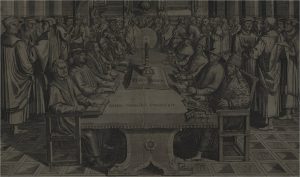Ukraine is experiencing a turning point in its history. Something old has ended and the new has not startedyet. Maidan Revolution, war, political and economic crisis has created the atmosphere for changes. Ukrainians theoretically understand that the real change can only begin from the inside – the hearts of individuals. Ukrainians look at the West and want to repeat its success.They are as Israel nation that was released from slavery but hasn’t entered the Promised Land which has the desired results: civil society, effective democracy, economic prosperity, rule of law, freedom and respect for the individual. Where is the way that leads us there and how to find it? Why were the abovementioned social phenomena born in the West, more precisely, in some Western countries and in other parts of the world they didn’t appear and take roots? Is it a coincidence or the result of environmental and other factors?
Stockholm is the capital of Sweden, a highly developed Scandinavian country that embraced Protestantism in 1524.
The Old Testament prophet appeals to the people of Israel:“This is what the Lord says: “Stand at the crossroads and look; ask for the ancient paths, ask where the good way is, and walk in it, and you will find rest for your souls!” Jer.6:16. History is the interpretation of the past for the sake of future. History is full of roads and signposts that might reveal the secrets of future success. There is no present without the past and the future is also determined by the processes and facts that were born in history. This raises another question – what drives the historical process? Karl Marx argued that being determines the consciousness. Of course it is so, but the story of the West clearly shows that consciousness determines being much more than vice versa. Of course, the way of thinking and values system determine conditions of life, but living conditions are much more shaped by faith, values and mindset.
What drives the historical process? Karl Marx argued that being determines the consciousness. Of course it is so, but the story of the West clearly shows that consciousness determines being much more than vice versa. Of course, the way of thinking and values system determine conditions of life, but living conditions are much more shaped by faith, values and mindset.
Particularly striking proof of this “anti-Marxist” paradigm is the history of Reformation. This story proves the veracity of biblical worldview that emphasizes the primacy of the spiritual over the material aspect. The Gospel of John begins with the words: “In the beginning was the Word, and the Word was with God, and the Word was God” (John 1:1).The Bible teaches us that the welfare of nations depends on whether they live according to God’s commandments. “If you fully obey the Lord your God and carefully follow all his commands I give you today, the Lord your God will set you high above all the nations on earth.All these blessings will come on you and accompany you if you obey the Lord your God (Deuteronomy 28:1,2)…”. But the law has a downside: “If you will not be listening to the voice of God and go after other gods…all these curses will come on you…”.
To verify the validity of these laws sufficiency one has to compare the standard of living in the North, South and Eastern Europe, North and South America, South and North Korea.The countries which have accepted Reformation have surpassed by economic and other indicators the countries that rejected Reformation choosing different options of humanism.
What is Reformation? Reformation is a spiritual and social movement that began with the speech of the German monk Martin Luther. In 1517 he expressed his protest against the deformation of biblical truth in the Roman Catholic Church at the time. Martin Luther as well as the following reformers after him: Philip Melanchthon, John Calvin, Ulrich Zwingli and John Knox advocated the return of the church to the biblical principles from which the medieval church had departedlong ago.

An imaginary dispute between leading reformers and Catholics (on the left side of the table: Luther, Zwingli, Calvin, Melanchthon, and on the opposite side: the Catholic representatives)
Reformation is the idea of returning the Christianity back to the biblical truth. The concept of Reformation is in its root ‘form’, i.e. the image. In the Bible we read that God created man in His own image and likeness. Creator who is the author of all reality has given certain standards for any reality – not only for the individual and the church, but also for society. This initial image form is lost under the influence of sin. Sin leads tothe deformation of a person, church and society. The prefix ‘re’means a return to the original form. Reformation is a movement that tries to see all areas of life from the biblical point of view, not just the religious sphere. Thus God’s principles influence not only salvation of souls but also the public sphere of life– culture, economy, politics. That is why Reformation is a spiritual and social phenomenon that radically changed Western civilization and, through it, the whole world as well.
Martin Luther and other reformers advocated the idea of rediscovering the Bible. Among them are the 5 most important Gospel truths that have not only changed the lives of individuals, but have had an incredibly large impact on the course of world history.